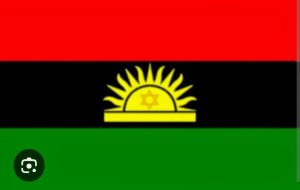

By Correspondent in Abuja.

(C) Google.
,,,,,,,Threatens legal action against any organization that calls IPOB, terrorist organization.
Dr. Maxwell Opara, a legal counsel to Mazi Nnamdi Kanu, leader of the Indigenous People of Biafra (IPOB), has cautioned against describing the group as a terrorist organisation.
In a statement issued Tuesday in Abuja, Opara said he would take legal action against individuals or organisations that continue to refer to IPOB as such.
He said the clarification became necessary to counter persistent misrepresentations and to reiterate IPOB’s status as a non-violent group advocating for self-determination.
According to Opara, IPOB is a socio-political movement that operates within the framework of national and international laws that guarantee the right to self-determination.
“I, Dr. Maxwell Opara, a legal practitioner, human rights advocate, and public interest litigator, acting on behalf of my client, Mazi Nnamdi Kanu, who is currently in the custody of the Department of State Services (DSS), hereby issue this public statement in the interest of justice and national unity,” he stated.
He described IPOB as comprising peace-loving individuals who seek to promote justice, equity, and development for the people of the former Eastern region of Nigeria.
“IPOB’s mission is rooted in peaceful advocacy, civic education, and engagement in democratic and legal processes. It does not promote violence or terrorism.
“The movement seeks a referendum-based path to self-governance, consistent with international legal standards such as the African Charter on Human and Peoples’ Rights and the 1999 Constitution of Nigeria,” he said.
Opara added that IPOB has maintained peaceful operations in various countries for over two decades and is recognised globally as a civil rights movement.
He noted that only Nigeria, through what he described as a controversial ex-parte judicial order, has labelled IPOB as a terrorist organisation — a decision currently under appeal at the Supreme Court.
He argued that the proscription was obtained without affording IPOB the opportunity for a fair hearing, contrary to legal norms and constitutional guarantees.
“The order was secured ex-parte and without IPOB’s knowledge, violating principles of due process and fundamental rights,” Opara said, stressing that any reliance on that order is legally contestable, as the case is still under judicial consideration.
He also criticised the recent statement by the Imo State Commissioner of Police, who allegedly linked IPOB to a violent incident without presenting evidence or making any arrests.
“Such pronouncements, made without thorough investigation or credible intelligence, risk profiling and unfairly attributing security challenges to IPOB,” he said.
Opara warned that any future attempts to categorise IPOB as a terrorist group — despite the pending legal appeal and lack of conclusive legal designation — could result in legal action for defamation.
“We shall pursue legal redress, including damages and injunctive relief, against any party that continues to promote false and damaging claims about IPOB.
“We urge that all public discourse regarding IPOB be informed by facts, guided by the law, and devoid of prejudice or political narratives,” he concluded.
Opara reaffirmed IPOB’s commitment to peaceful advocacy and reiterated that the group does not subscribe to violence in its pursuit of self-determination.
Edited by Dada Ahmed.


